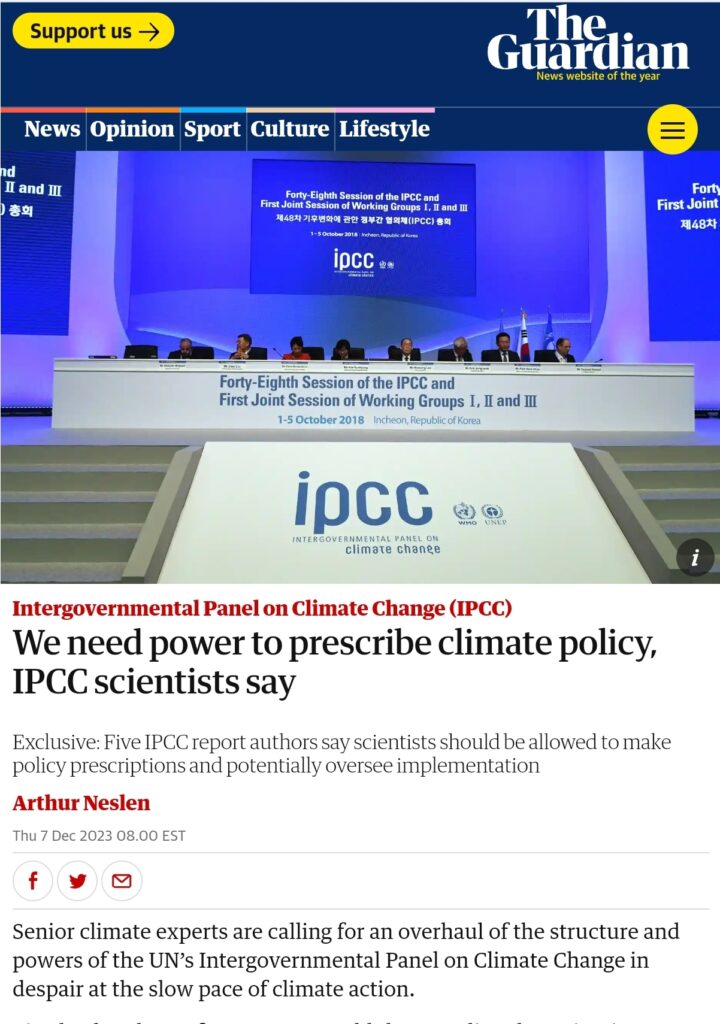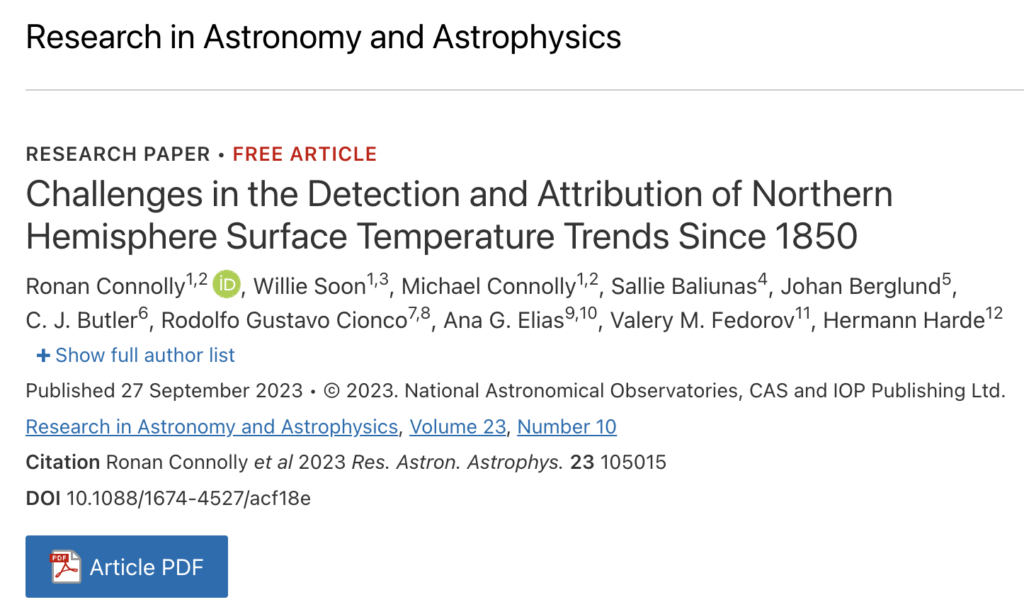UN IPCC’s New ‘Hockey Stick’ Temperature Graph
IPCC’s New “Hockey Stick” Temperature Graph by haakonsk The United Nations’ Intergovernmental Panel on Climate Change (IPCC) published their latest assessment report (AR6) in 2021. In 2023, the Clintel Foundation published a report which criticizes AR6. Clintel is short for Climate Intelligence, and the Clintel Foundation doesn’t think there’s a climate emergency. Overall, Clintel’s main criticism is that […]
Navigating the Complexity of Climate Change: A Closer Look at the Scientific Method and Its Challenges
https://mises.org/wire/navigating-complexity-climate-change-closer-look-scientific-method-and-its-challenges 01/31/2024Frank Hollenbeck The physical sciences have greatly advanced knowledge by elucidating the workings of simple phenomena. In a simple phenomenon, we have a limited number of important variables, all of which are identifiable and measurable. This allows us to run a scientific experiment. In such an experiment, we hold all other variables constant and […]
Technocracy: Critics Slam UN ‘Climate Scientists’ Bid for Dictatorial Power
https://thenewamerican.com/world-news/un/climate-conference/technocracy-critics-slam-un-climate-scientists-bid-for-dictatorial-power/ by Alex Newman DUBAI — Top leaders at the United Nations Intergovernmental Panel on Climate Change (IPCC) are seeking the power to prescribe “climate” policy at the international level and then potentially even oversee its implementation and enforcement. Critics, however, warned that the demands were not just unscientific, but would undermine self-governance while ushering in […]
Scientist Dictators emerge at Cop28! UN IPCC scientists declare: ‘We need power to prescribe climate policy’ – ‘Scientists should be allowed to make policy prescriptions & potentially oversee implementation’

Morano Comment: “The UN scientists were jealous when they saw how public health officials could implement authoritarian policies during COVID & and now they want Fauci-like powers!”
New Study: UN IPCC Global Warming Reports Underestimated Role of Sun in Warming

https://www.theepochtimes.com/mkt_app/science/ipcc-global-warming-reports-underestimated-role-of-sun-in-warming-says-study-5505795 Via Epoch Times: Depending on the solar activity and temperature records used in the analysis, warming can be blamed on the sun, human activity, or both, the study found. Talking about the results, Dr. Willie Soon, an author of the study, said that “if the IPCC had paid more attention to open-minded scientific inquiry […]
Former UN IPCC Lead Author Dr. Richard Tol: ‘Climate change’ is ‘not the apocalypse’ – Warns of ‘misguided fear of doom’

Dr. Richard Tol: “Climate change is a problem, but not the apocalypse. The misguided fear of doom causes extremism and exaggerated climate protection policies.”
“The environmental movement is massive. Its leaders need to bring in lots of people and donations because they derive their power and influence from that. The story of the apocalypse as a vehicle for climate change neatly ties in with painting emissions as sin and emission reduction as atonement. It is a brilliant marketing ploy.”
“Global average crop yields have increased three-fold over the last 60 years. If that trend continues and climate change takes away half, we will grow roughly the same amount of food, per head, in 2085 as we do today…if farmers would use current best practice, not some yet-to-be-invented future technology, they would get 10 times as much produce from their land. Let climate change take away half and they still grow 5 times as much.”
Scientist admits the ‘overwhelming consensus’ on the climate change crisis is ‘manufactured’
The UN created the Intergovernmental Panel on Climate Change. “The IPCC wasn’t supposed to focus on any benefits of warming. The IPCC’s mandate was to look for dangerous human-caused climate change,”climatologist Dr. Judith Curry said. “Then the national funding agencies directed all the funding . . . assuming there are dangerous impacts. The researchers quickly figured out that the way to get funded was to make alarmist claims about ‚”man-made climate change” This is how “manufactured consensus” happens.
Judith Curry: How Climate ‘Science’ Got Hijacked by Alarmists – John Stossel Report
Climate alarmists insist there’s a “scientific consensus” that says climate change is a crisis, and man causes it! Researcher Judith Curry tells me, “it’s a manufactured consensus.”
Dr. Roger Pielke: ‘Neither the UN IPCC nor the US National Climate Assessment have high confidence in detection or attribution of trends in heat waves is the US’
Neither the IPCC nor the US National Climate Assessment have high confidence in detection or attribution of trends in heat waves is the US So either the IPCC is wrong or the media/activist scientists are wrong. Pick one.https://t.co/5ArB5GJdML pic.twitter.com/JHfW7zQOjg — The Honest Broker (@RogerPielkeJr) July 25, 2023 The latest from World Weather Attribution on recent […]
New Satellite Evidence Suggests 20-Year Fall in Extreme Rainfall Events Globally
https://dailysceptic.org/2023/06/22/new-satellite-evidence-suggests-20-year-fall-in-extreme-rainfall-events-globally/ BY CHRIS MORRISON In its latest assessment report, the UN’s International Panel on Climate Change (IPCC) states that the frequency and intensity of global heavy rainfall events “have likely increased” over the majority of land regions. The claim forms the backdrop for countless stories of increased deadly flash-flooding brought on by human-caused climate change. Alas, […]
